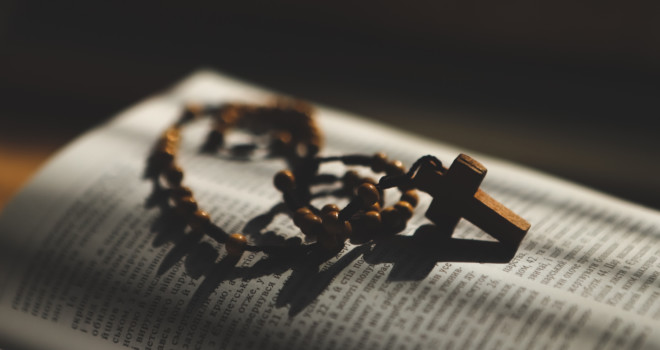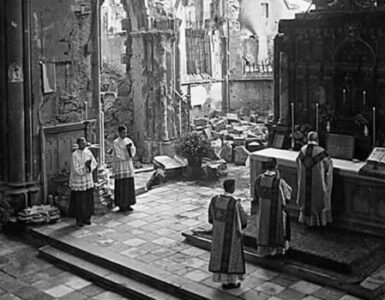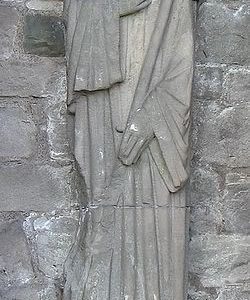I gingerly picked up a faded photo from my high school album. It had been tucked away in an upstairs closet for years. For most of my adult life, I didn’t choose to revisit those old memories, because it required me to open old wounds, too. But pregnancy and childbirth, combined with chronic sleep deprivation, makes for a cocktail of vulnerability.
Something inside told me to pause, and I observed that girl I was twenty years earlier. In the photo, I was smiling with my friends. I remembered that day vividly – I felt out of place, an outlier, but my friends told me to snap out of my mood and “just smile.” So I did.
As Catholics, we tend to feel, from time to time, a sense that we are different. It’s because we are. By our baptism, we are set apart—not in a sanctimonious, superior sense, but in an anointed purpose.
These days, our hearts are nearly always torn between two worlds—what is eternal and what is temporal.
Doing the work of God can be lonely and frustrating. It’s why I sensed that I wasn’t exactly like my friends, though I desperately wanted to be. But our conversations centered around the secular, popular way of living, and I didn’t feel comfortable with that.
If we desire to build a culture of holiness, we have to acknowledge that the world in which we are living desperately needs the message of Christ that can only be delivered through you.
Building a Catholic culture in your home involves five basic steps:
- Understanding the culture in which you live
- Following truth
- Assembling broken fragments
- Doing something new
- Looking to the future and creating a legacy
Understanding the Current Culture
We can ask ourselves: Is culture shaping me, or am I creating culture? We are all influenced by the world, bombarded with messages from the media, and immersing ourselves—albeit at times subconsciously—into the shadows of “what everyone else is doing.” Over time, we become numb to what is truly good and truly evil.
Much of the suffering we face in creating culture is that we allow culture to shape us or we let others do the work we are called to do. Creating culture is like chiseling rock—it involves intentionality and time.
Following Truth
If we want to grow in sanctity, we have to face the reality that the Cross must be integral to the way in which we live. This means making sacrifices (e.g., and doing what is challenging on a daily basis. In order to progress in this, we can pray for the virtue of fortitude, which includes patience and perseverance.
Regardless of obstacles, hardships, trials, and chaos, truth endures. You will find what you are looking for.
Assembling Broken Fragments
Sometimes creating a Catholic environment means picking up the pieces of what someone else started (or even what you started a long time ago). There will be moments of rebirth and renewal, and moments when you have to begin again. To prevent discouragement, remember that the Star of Bethlehem still shone, even when it was no longer visible and, in fact, concealed by clouds.
Doing Something New
Do something totally new and original with what you already have. When you believe in what you are doing and what God has placed upon your heart, nothing can stand in your way. That is true confidence in faith! When you carry such faith, it propels you beyond stagnancy and affects others who come after you (e.g., your progeny). Your work will not die or finish.
Looking to the Future and Creating a Legacy
We have a future. We are a Church of the future, not of the past. We have to look where God is leading us, not where we’ve been. Create a culture that others can continue, where sacrifice is normal and God is sought in everything. Don’t do something old as if it were new or something new as if it were old. Be willing to quit what you are doing at any moment and go wherever it is you are called (think: St. Teresa of Calcutta).
Any form of construction, be it spiritual or physical, necessitates that we don’t know exactly where we’re headed. Sometimes we will never see the conclusion of our life’s work. When you chase something higher than the world offers, you become lured and persuaded by the lights God initially favors you with, but there’s no absolute conclusion.
Building a Catholic lifestyle does not mean you will go to extreme measures of self-flagellation or consuming only herbs and water. It’s not so much in the outward, Pharisaical signs others will find shocking or disturbing. It’s more in what becomes second nature—a rhythm, a cadence that constantly reveals, however subtle, the undercurrent of God’s presence and love.
✠
image: Happy Max / Shutterstock.com












